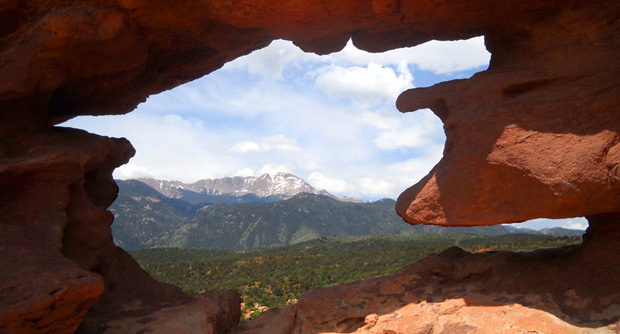That's what I'm talkin' about!The last two entries described
how Jim and I gradually came to be traveling around the country for nine
or ten months of the year, living in our 5th-wheel camper. Friends,
people we meet along the way, and folks who read our web journals often
ask us questions about this lifestyle and/or indicate an interest in
doing some version of it themselves.
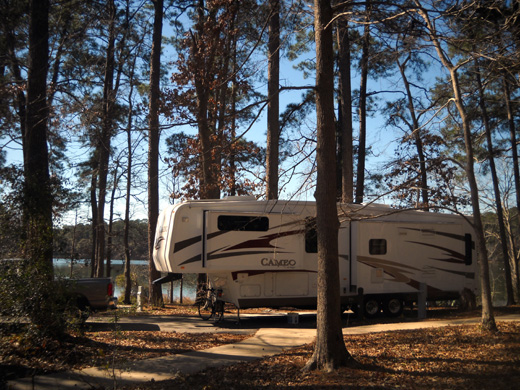
Our traveling home, a Carriage
Cameo (photo
taken at Raven Lake in Huntsville State Park, Texas)
This entry and the seven (yes, seven!) that
follow are for readers of any age who have a serious case of wanderlust
-- from those who dream
about traveling around in an RV (recreational vehicle) for extended
periods of time to those who want to sell their house, dispose of and/or
store almost all of their belongings, and have even more freedom to roam
in a little house on wheels.
They are also for people who are just curious about "the RV
lifestyle." Maybe it will plant a seed in someone's mind that will later
germinate into, "Gee, that sounds like something I'd enjoy!
Let's give it a go."
As you'll see, there isn't just one way to enjoy this lifestyle
but many variations on the theme. Maybe one of them is right for you
someday -- or now.
WHO TRAVELS & LIVES IN AN RV ALL OR MOST OF THE
TIME?
All kinds of people -- male, female, older, younger,
richer, poorer, retired, still working . . .
There is no one "type" of people who gravitate to this lifestyle, and
there are many versions of it.
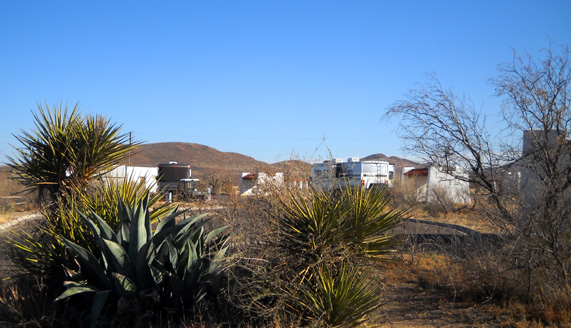
Two Class A motorhomes at Balmorhea State Park in Texas,
a pleasant place to camp in January.
Even though Jim and I have vacationed and traveled to races for short
periods of time in an RV for four decades, we weren't completely aware
until a few years ago that there are well over a million people
in the United States who live in their RVs for months or years at a
time -- deliberately, for the fun of it, not because it's all
they can afford.
Just how many people live like this is hard to pin down because people transition in and
out of the lifestyle and ten-year census figures just don't capture
what's happening.
The 2010 census was supposed to
reflect who was living where on April 1. How was someone supposed to
find us in a campground in Georgia on that date? We ended up
calling the national census number and giving our information over the
phone but I'd bet a lot of RVers weren't even counted unless they
initiated a phone call like we did. I can't remember
if there was even a category for full-time RVers. There certainly isn't
one for the way Jim and I travel and live. The person I talked to was
pretty confused about our lifestyle!
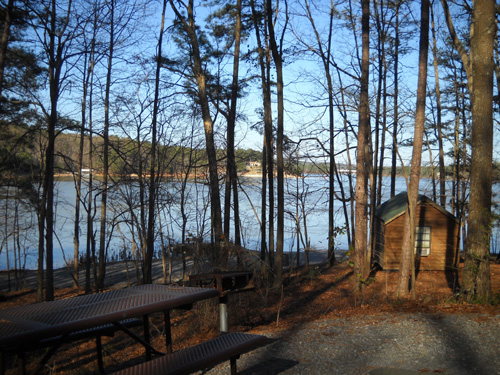
View of Lake Allatoona from our
campground at a Navy recreation area (April, 2010)
Some RVers still own a piece of dirt** (any type of
living quarters that is stationary) that they call home and venture forth for long periods
of time in their camper. I call this extended-travel in an RV; it's what
Jim and I do, although we don't consider our house to be our home. Our
camper is our home, the place where we live 9-10 months of the
year. I described our version of this lifestyle in the last
two entries.
[**Selling the dirt" is a term we read in one of the Carriage, Inc.
internet forums. It amuses us.]
Other folks have bravely "sold their dirt," sold/given away/stored
their possessions, and headed off into the wild blue yonder in their RV.
They are full-timers. They are not homeless; their house on
wheels is their home. It's a rolling residence that moves around the country, giving them
a measure of freedom unknown to the rest of us.
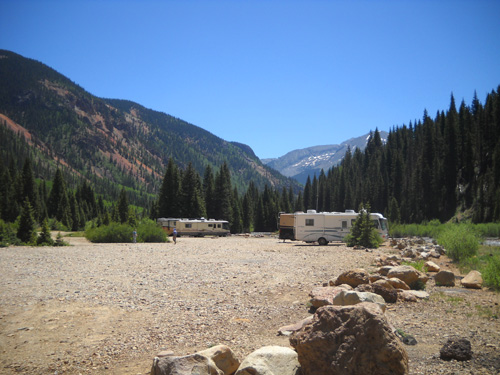
June, 2010: before the 4th
of July crowd hits the National Forest Service
dispersed campgrounds along S. Mineral Creek
near Silverton, CO
Some people love full-timing so much they've been roaming around in
RVs for decades. At the other extreme are folks who quickly find out
that type of life is not for them, and they resume living most or all of
the time in permanent housing.
Most full-timers are somewhere in between, spending several years on
the road until they tire of it or something (often it's medical
problems) compels them to re-settle in one area. Even when Jim and I sell
our current house we'll probably get another house, condo, or apartment at some
point in the future when we get tired of traveling all the time, have
medical issues that prevent it (like the knee or hip replacements I'll
eventually need), and/or something else changes our minds about living in
our RV.
Life is full of transitions and we'll adapt as needed. Meanwhile,
it's a lifestyle we love.
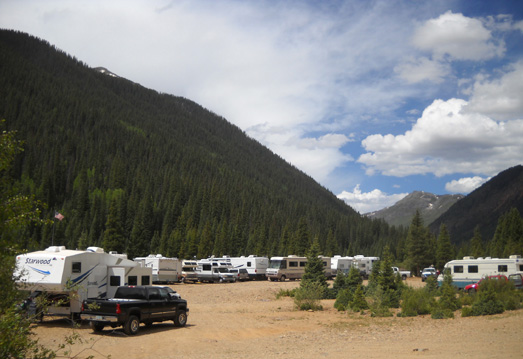
Late June, 2010: same
campground, different view -- starting to get crowded before the
holiday.
The majority of full-time and extended-travel RVers are retirees but
an increasing number of younger couples and singles are finding ways to
earn an income while they're traveling around the country. Electronic
advances and the internet make this easier on everyone, whether Grandma
just wants to keep in touch with her grandchildren via e-mail, a young
Baby Boomer ditches the corporate rat race to write travel articles for
a living, or a Gen-Y'er
wants to develop a career building websites.
Any of them can do these things from anywhere in the country -- or world,
for that matter. Why not do it in a comfortable RV and be able to move around at
will, following your muse?
WHAT MOTIVATES PEOPLE TO DO THIS?
Lots of reasons. Here are a few of them:
- They want to see as much of our country/continent as possible
before they're unable for some reason to do it. It's a wonderful
chance to see as many of the national parks as possible, for example,
to visit cities and states you've never seen, to retrace historic old
roads like Route 66, to run races or attend
sporting events all over the country, to follow birding trails or
spring wildflowers, to
visit friends and relatives strung from one coast to the other --
whatever you've always wanted to do but didn't have the time to do
previously.
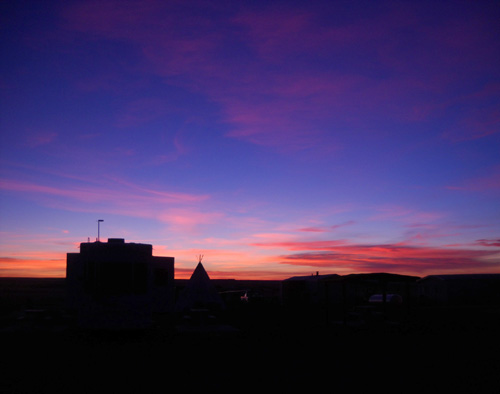
Sky drama: our Cameo and a
tee pee in the campground are silhouetted
against a bright sunset at
Petrified Forest Natl. Park (January, 2011)
- They seek a simpler lifestyle with less stress, less "stuff," and
more time to pursue personal growth instead of being beholden to a
house, yard, community, and other commitments. Sometimes
we get so wrapped up in accumulating things that we don't accumulate
experiences. Or we're so busy working or raising families or serving
on committees that we lose sight of what makes us unique
individuals. There are few demands on your time and energy when
you leave all or most of those obligations behind. Every day can be
yours to fill with activities that bring you the most enjoyment. Is
that selfish? Some people think so. I think it's a great way to
maintain one's sanity in this hectic, wacky world. You
can be as active or relaxed as you want when you're roaming around the
country in a camper. Jim and I have joked since
retiring that "everyday is Saturday." It's even more true with an
RV lifestyle.
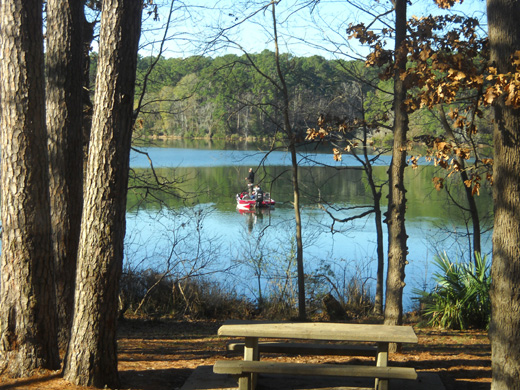
The epitome of relaxation? Fishing
in Lake Raven on a warm day
in January (Huntsville SP, Texas)
- They are "snowbirds," spending the winter months in warm Sunbelt
states while most folks are shivering, shoveling snow, and sliding
around on icy roads in colder places (this winter even Florida has had
its share of sub-freezing weather, however). Jim and I usually head
for southern Arizona and Texas in the winter. I guess we qualify as
"Winter Texans" because we're there most of January, February, and
March. In the summer, when the southern tier states get uncomfortably
hot, the snowbirds tend to flock back north or go to higher elevations
where it's cooler. (Which is why we see so many Texas tags in
Silverton, CO, elev. 9,000 feet, in mid-summer.) That's our MO, too.
We choose campgrounds in the high Rockies from New Mexico to Idaho or
Montana
between May and October. We live in what I call the "Dandelion Time
Warp" because the temperatures are spring-like and we see dandelions
everywhere we go from January to December.
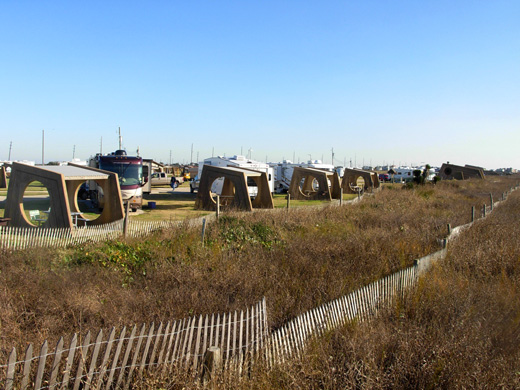
Camping next to the beach at
Galveston Island SP was a great winter retreat
until Hurricane Ike destroyed the
place. (January, 2008, before the summer storm)
- They want to live on less money. This is quite doable unless you
want a luxurious RV and lifestyle. Some retirees who are full-timers
are able to live on only their Social Security checks by choosing less
expensive or pre-owned RVs, cooking their own meals, finding
inexpensive camping options, and enjoying free or cheap forms of
entertainment. Some retirees live primarily on their pensions,
retirement accounts, investments, proceeds from the sale of their
house, and/or other forms of savings. Some find ways to earn
additional income as they travel by working as campground hosts,
selling books they write, using their carpentry or mechanical skills,
etc. The RV lifestyle is especially affordable if you don't have all
the expenses associated with owning a house. (I'll go into more detail
about the costs of RVing in another entry.)
- They have a job that requires frequent travel and they don't want
to stay in a motel every night -- traveling nurses, teachers, speakers,
salesmen, construction workers, consultants, entertainers, etc. Having their
own comfortable home on wheels makes a lot of sense.
- They want the freedom to roam while still earning a living doing
some type of rewarding work like writing, photography, even leading RV
caravans to special places like Alaska -- things that can be
done from their RV instead of a cube farm.
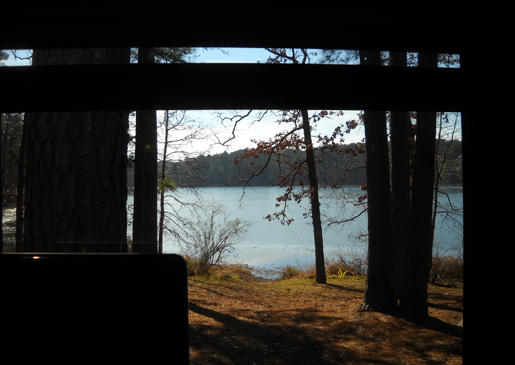
View from my computer desk in
the Cameo: would you rather work here in January . . .
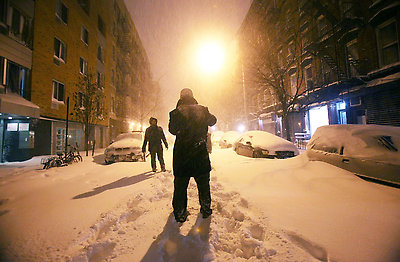
. . . or trudge through city snow to reach your
office??? (photo
credit)
CAN YOU GIVE ME SOME EXAMPLES OF DIFFERENT RV
LIFESTYLES?
Sure. There are many variations depending on the types of RVs people
have, how much they travel around in them, where they park/camp, and how
they spend their time.
There are two basic RV lifestyle categories I'm talking about here
-- folks like us who travel and live most of the time in
an RV but who still have a "stick" house, condo, mobile home, apartment, or other
stationary place they own or rent, and those who travel and live full-time in their
RV with no stationary abode.
I'm not talking about people who buy an RV and live full-time
in it on a lot, similar to folks in mobile home parks, and never travel around in it. It's fine
if they want to live in one place all the time but that's not the lifestyle I'm
describing here. This series of entries is about folks who travel
in their campers.
That doesn't mean they're constantly on the road, however. There are
many variations in regards to mobility.
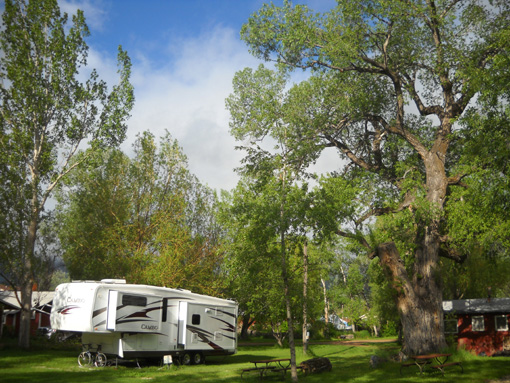
Foothills CG at the foothills of
the Bighorn Mountains of Wyoming has a low monthly rate
in the summer -- and probably even
lower in the winter! (June, 2010)
Jim and I probably move around more than most retirees because 1)
we're usually following races we want to run and 2) many of the public
campgrounds where we prefer to stay have two-week limits. The longest
we've ever stayed in one spot was three months and that was not a place
we really enjoyed. It was the only place available in late winter/early
spring when we bought our house near Roanoke and we had to wait to move
into it.
Otherwise, I think the longest we've ever camped in one spot so far
is a month.
We usually stay at destination campgrounds for one to three weeks, then
move on to the area where our next race is located so we can train on
the course. We often stay for one or more days at an interim location to
see something new, revisit a favorite place, or visit with someone on
our way to the next race venue.
Some RVers move even more than we do, for whatever reasons. They may
have the goal of visiting all 50 states (or at least 49 of 'em!) and
Canadian provinces in a certain period of time, or they're following
migrating birds so they can add to their lifetime bird count. Maybe they just get bored in one place
and like to move around.
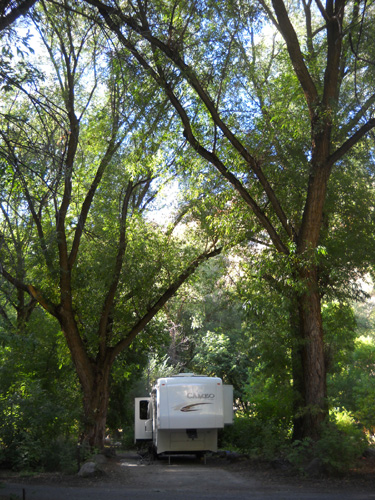
The Cameo is dwarfed by huge
trees at Guinavah CG near Logan, UT.
NFS campgrounds like this have a
14-day limit when they are full. (September, 2010)
At the other extreme are RVers who stay put for months at a time.
Some purchase RV lots with storage units and use it as their home base
in either the summer or winter. Others find good seasonal rates in
various campgrounds. It's common for snowbirds to spend the entire winter at
a private RV park in Florida, for example, or boondock in one place like the
long-term BLM areas in Quartzite, Arizona. Then they move on to cooler
climes when those places heat up in the spring.
Other people who remain in one place for longer periods of time
include campground hosts, folks who are still employed part time,
retirees who want to be near their grandkids all summer, and people
receiving long-term medical treatment. Those are just a few examples.
Moving around a lot can be more expensive than staying put for a
longer period of time because of the fuel costs. On the other hand,
moving from one free or inexpensive campground to another in the same
general area every two weeks can be cheaper than spending several months at
a more costly private campground.
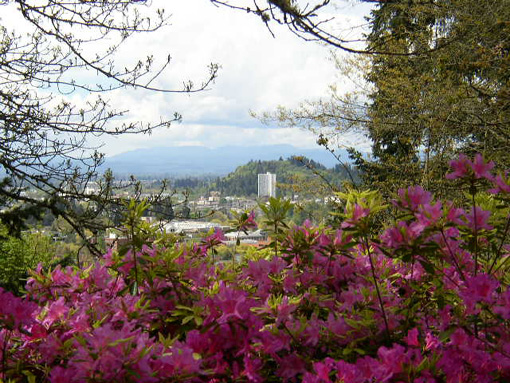
Portland, OR is beautiful in the
spring but we haven't been there since 2003.
There are places Jim and I would love to visit if they were closer and didn't
require so much diesel fuel. We are itching to go to Alaska for an
entire summer, for example, but so far we have ruled it out in part because
of the huge cost to get there. It's expensive enough for us to travel
back and forth between Virginia and Rockies/Southwest twice a year.
Alaska is a trip we'll probably postpone until we sell the house, are full-timing
in our RV, and
can spend more time in northwestern U.S. and Canada to make it more cost-effective.
MORE LIFESTYLE EXAMPLES
There are other variables involved when you're describing RV
lifestyles besides how often people move from one place to another -- different motives for traveling in the first place, different
types of RVs they drive, different kinds of campgrounds and other places
to park, different ways of spending time and money on food, activities,
and hobbies . . .
There are as many different RV lifestyles as there are people who
travel and live in RVs. You just start out doing what you think you'll
enjoy and your budget, interests, and experiences will dictate how that
morphs over time!
It's been a gradual process for us and I'm guessing it is for most
RVers. You learn a lot as you go -- as much about yourself,
possibly, as the places you visit.
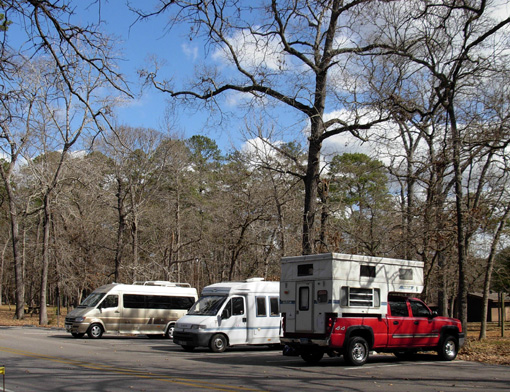
The RVs of three of our ultra
running friends who ran the 2009 Rocky Raccoon 100-miler.
All of them travel in their
campers either extensively or full-time.
Some of the RVers we know are ultra runners like us who frequently
travel in their RVs to races and great places to train. Some own houses,
some full-time in their camper. They travel in everything from little
truck campers to big ole Class A rigs. Some camp for free at trailheads,
on forest service land, or in urban parking lots every night. At the
other extreme are the ones who prefer luxury RV resorts. Some eat out
most of the time, rarely using their RV refrigerator or stove. Some
prepare gourmet meals in their RVs. Some are loners. Some need constant
social stimulation.
People who follow NASCAR races, golf tournaments, and other sports
events around the country are similar to -- or should I say, just as
widely varied as -- our ultra running friends.
So are the folks who want to visit all the states or
national parks, follow an historic route like the Oregon Trail or Route 66, visit the quirkiest
museums they can find, tee up at the finest golf courses, hunt for rocks
and gems, geocache in new venues, photograph old Spanish Missions, climb the high points in every state,
drive the length of scenic byways like the Blue Ridge Parkway, visit
Civil War battlefields and re-enactments, attend RV rallies, add to
lifetime bird counts, go to NASCAR races or quilt shows or minor league baseball
games or hot air balloon shows or scrap-booking conventions or antique
auto shows or model airplane fly-ins all over the country . . .
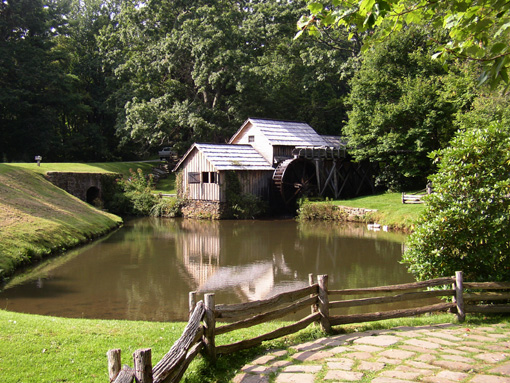
Mabry Mill, a popular landmark
along the Blue Ridge Pkwy. in Virginia (summer, 2004)
You can combine an RV lifestyle with almost
any interest you have. Be creative and add to your bucket list.
RVers can be as active or sedentary as they want. Jim and I enjoy a
wide variety of activities when we're traveling/living in our RV. We
exercise almost every day by running, hiking, walking, cycling, working
out at a local YMCA, or doing yoga. We visit museums and historical
places that interest us. We walk around the campground and talk with
other campers. We sit outside or gaze out the windows to absorb the
peace of the mountains, water, or forest within our view. There's always
something to do, or absolutely nothing at all.
That's the beauty of the RV lifestyle -- you can make it
anything you want.
Next topic in this series: personality and people issues --
who is most likely to enjoy this lifestyle? how can two people live in
harmony in a little home on wheels 24/7?
Happy trails,
Sue
"Runtrails & Company" - Sue Norwood, Jim O'Neil,
and Cody the Ultra Lab
Previous
Next
© 2011 Sue Norwood and Jim O'Neil
